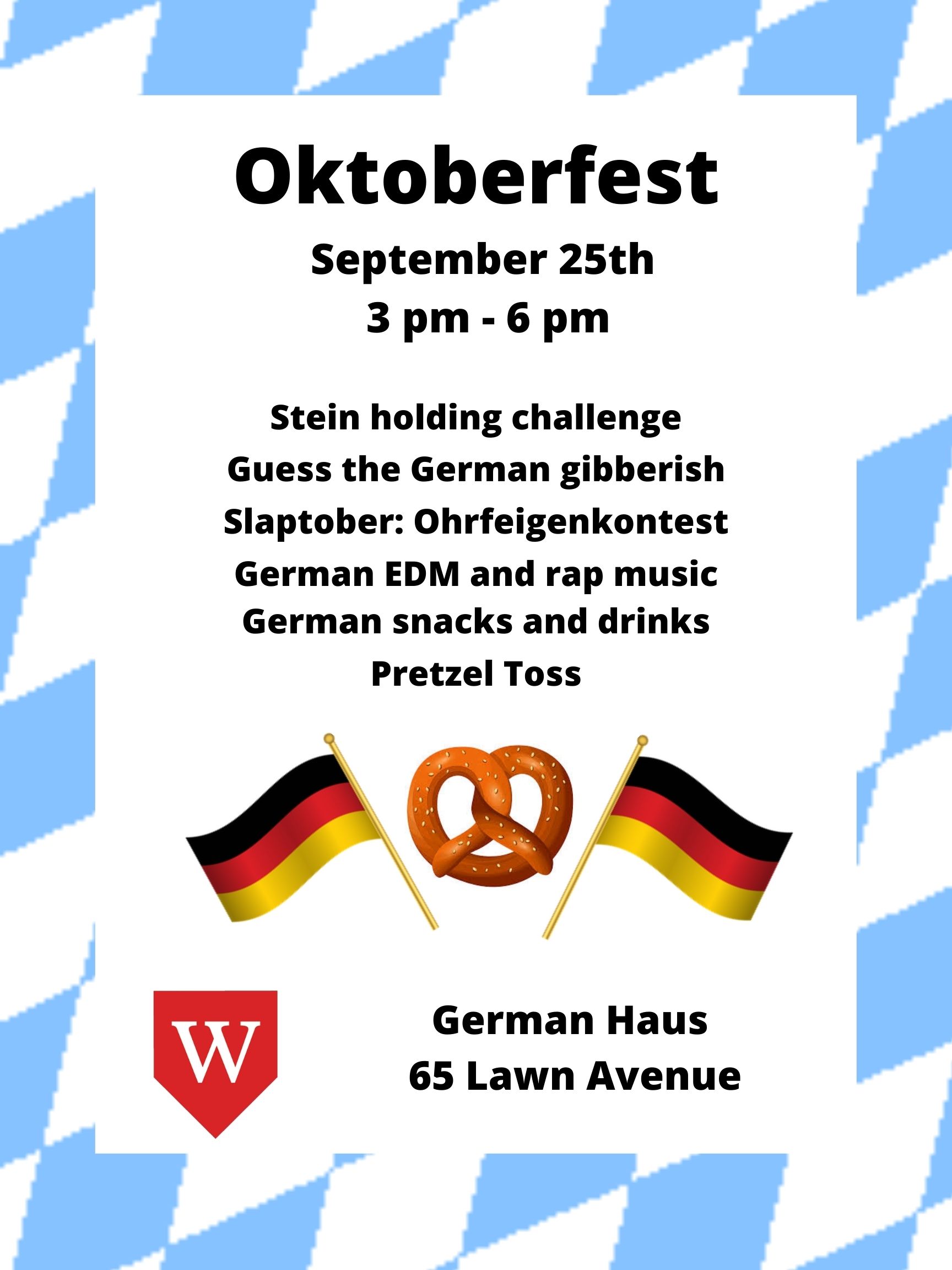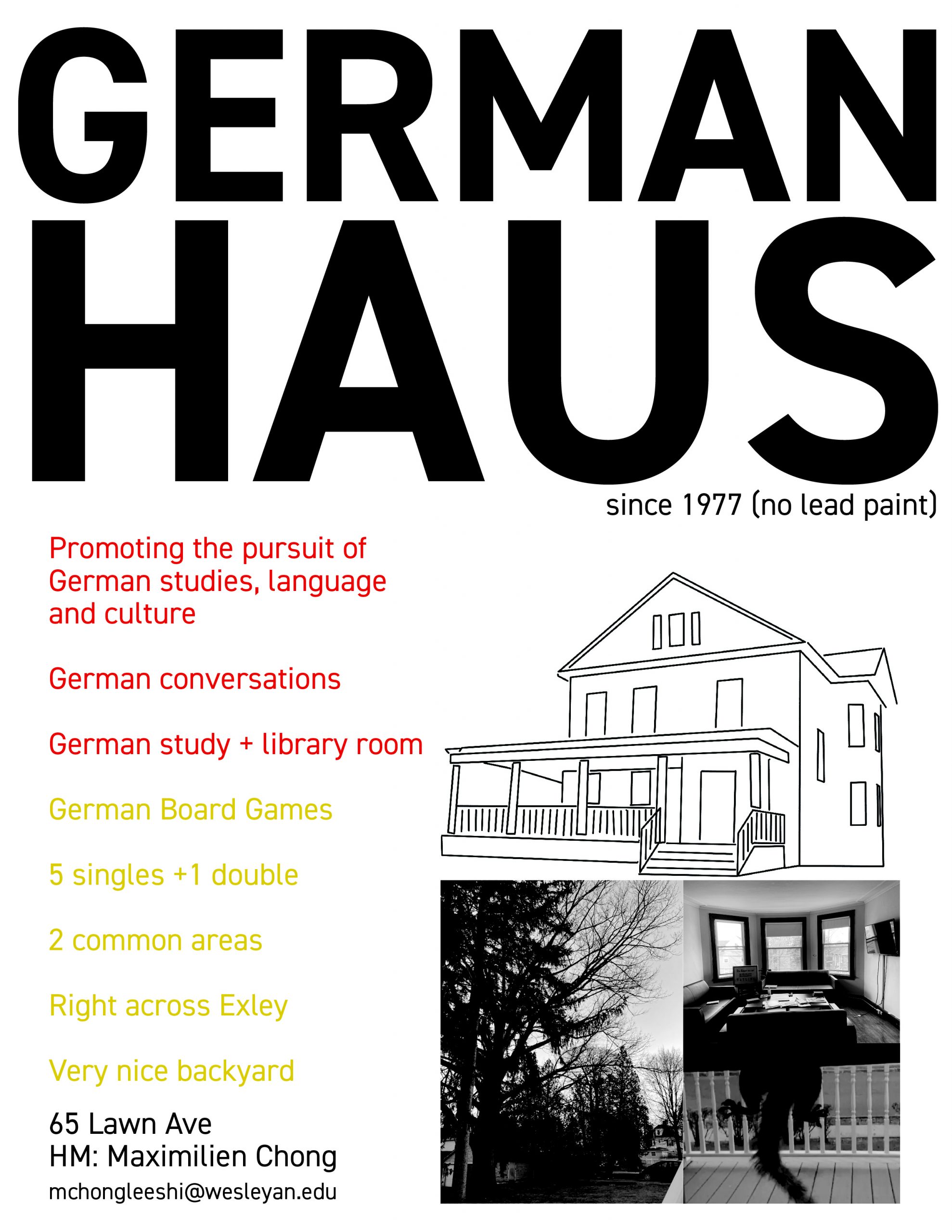Please note that the party will take place on Friday, April 1, 2022.
 Iris Bork-Goldfield
Iris Bork-Goldfield
German Movie Night – online
| February 25–27 Online |
 |
| Image: Joel Basman and Marie Leuenberger in Caged Birds |
| Oliver Rihs, Caged Birds (Switzerland/Germany, 2020, 119 min.) Barbara “Babs” Hug is a young radical lawyer fighting Switzerland’s antiquated prison system in the 1980s. She is tracked down by Walter Stürm, a Foucault-reading convict who has just managed to escape from prison – again. With the police closing in, Babs finds Walter temporary refuge with a militant organization, and takes him on as a client in hopes of using the Jailbreak King’s publicity to advance her cause. But the less Walter yields to her reasoning, the more Babs falls for his uncompromising idea of freedom. Based on a true story. Free streaming in the U.S. as part of our monthly German Movie Nights. Register to attend. |
New: Gilman-DAAD Germany Scholarship
Click HERE for more information and how to apply

News From Our Recent Alumni

Several of our GRST majors and minors have been living and studying in Germany this fall. I asked them to share some of their experiences with us. So far, I have received three letters that I would like to share with you. The first letter is from Evelyn Mesler ‘21, who majored in German Studies, Biology, and Data Analysis. She is currently pursuing a master’s degree in Infection Biology at the Universität zu Lübeck in Lübeck, Germany.
The second letter is from Jenna Lacey ’21. She majored in Government and minored in German Studies. Currently, she is studying Public Policy and Social Change at the University of Tübingen and has good tips for anyone who is thinking about studying in Germany.
There are many ways to go about spending a year or two in Germany after graduation. You might want to apply for a German Exchange scholarship (DAAD) like Evelyn Mesler ’21. If you are a graduate student at Wesleyan, you can also apply for a Baden-Württemberg Exchange scholarship to study and/or do research at one of the nine prestigious universities in Baden-Württemberg. If you are interested in one of these scholarships, please talk to my colleagues in the GRST department, Profs. Ulrich Plass, Martin Bäumel or me (Iris Bork-Goldfield). Another good option—but only for American citizens—to study, research or teach English (ESL) in Germany, is to apply for a Fulbright scholarship. There are also opportunities to teach ESL in Austria with a Fulbright scholarship (USTA).
The third letter is from Patrick Wolff ’21, who is currently living and studying in Göttingen. He received a Congress-Bundestag Youth Exchange scholarship. This scholarship for Young Professionals (CBYX) is a fellowship funded by the German Bundestag and U.S. Department of State that annually provides 75 American and 75 German young professionals between the ages of 18½ and 24 with the opportunity to spend one year in each other’s countries: studying, interning, and living with hosts on a cultural immersion program.
I hope you enjoy their news!
Iris Bork-Goldfield (Adj. Professor of GRST)
Evelyn Mesler’s news from Lübeck
With the help of the German Studies department and particular support from Professor Krishna Winston, I was able to apply for a master’s scholarship from the German Academic Exchange Service (Deutscher Akademischer Austauschdienst, or DAAD) during the fall of my senior year at Wesleyan. The scholarship from the DAAD unlocked an amazing opportunity to study Infection Biology here in Germany.
As of writing this, I have been in Lübeck for almost two months, and each day feels like a dream.  My master’s program is incredibly rigorous- in the first semester alone, I must complete seven classes (and I thought 5 Wesleyan classes was a full schedule: I now feel so naive). But the classes are taught by clinicians, diagnosticians, public health experts, and researchers studying diseases that I find incredibly fascinating, so I feel lucky to attend their lectures. There is a strong network of international students at my university, and I have been able to meet students from all over the world while we do activities like cooking, ice skating, and lantern making for St. Martin’s Day. Next weekend, I am travelling with our international group to Berlin.
My master’s program is incredibly rigorous- in the first semester alone, I must complete seven classes (and I thought 5 Wesleyan classes was a full schedule: I now feel so naive). But the classes are taught by clinicians, diagnosticians, public health experts, and researchers studying diseases that I find incredibly fascinating, so I feel lucky to attend their lectures. There is a strong network of international students at my university, and I have been able to meet students from all over the world while we do activities like cooking, ice skating, and lantern making for St. Martin’s Day. Next weekend, I am travelling with our international group to Berlin.
The city of Lübeck feels as though it came right out of a storybook: narrow cobblestoned streets with small arches leading to courtyards filled with roses and ivy climbing up old brick buildings. The city itself is an island surrounded by canals, so on sunny days I often walk along the bank and watch rowers pass me by.
Now that Christmas is coming, the city is being transformed into a Weihnachts wonderland. On my street, evergreens line the sidewalk and tinsel, and large toys are suspended across the street from one house window to another. Tonight, is the grand opening of the Weihnachtsmarkt, so some colleagues and I are planning on going together and enjoying spiced Glühwein, Lebkuchen, and probably some bratwursts, too 🙂
I am so grateful to have made it to Germany, and I would never have accomplished this dream without the support and fantastic education I received from Wesleyan and the German Studies department, in particular. I hope to pay their generosity forward and would love to provide other students interested in studying in Germany with help and guidance in their search!
Jenna Lacey’s news from Tübingen

My program here at Tübingen is very research focused and takes a broadly comparative approach to public policy. I’ve been enjoying my classes and cohort so far and living in Germany has been really lovely. I’m soaking up as much of the good public transit as I can. I’ve visited a few castles, eaten Stockbrot, bread baked over a bonfire (like a marshmallow), and been surprised by a bus strike.
Tips for people thinking of studying in Germany
- Adjust your study habits: The way classes at German universities tend to work is you attend lectures, you might have to give a presentation at some point for a couple of ECTSs (European Credit Transfer System), and then you have an exam which determines your grade for the class. You might have smaller assignments, but these are usually just graded for completion and part of the requirement to get credit for actually attending and participating in lectures. You also don’t have midterms that force you to solidify your knowledge of the first half of the course, thus cutting down on the number of materials you have to study for your finals. So develop study habits that force you to do this sort of knowledge solidification: write out potential exam questions about that week’s material, get together with friends halfway through the semester and pretend you’re studying for a midterm, etc.
- Figure out as much of your general living affairs as you can prior to arriving in Germany. Apply for health insurance early, get a bank account set up early if you can, and if possible, it may be beneficial to apply for your residence permit before you arrive. This isn’t strictly necessary if, by virtue of your citizenship, you’re allowed to enter the country without a permit and then apply for one (this is the case for U.S. citizens), but it may take a lot of stress out of the first couple of months of living in Germany.
- Listen to native speech as much as possible. Watch Tagesschau, listen to podcasts (like WesGerman), watch videos on the Easy German YouTube channel. The German classes at Wes are excellent, but at the end of the day your professors are the only native speakers you have contact with on a regular basis. Listening comprehension is extremely important, whether your intended program is completely or partially in German, or you only need German for non-academic settings.
Patrick’s news from Göttingen

Hello! I’m Patrick Wolff (’21) and I’m a member of the 38th CBYX cohort. The 11-month fellowship stresses cultural exchange through three phases: language learning, a semester at a German university, and gaining work experience.
In the first two months I lived in Cologne to attend an intensive language course. Class was Monday-Friday from 9:00-1:00. During my time there I lived with a host family—an essential and highly recommended component of the program—for the purpose of full cultural immersion. In my free time I got to know the other 35 Americans from the program located there. Together we traveled to nearby cities by train and bike, visited museums and concerts, gathered for potluck dinners, played sports and games in the parks, and experienced Cologne’s abundant nightlife.
In October, I moved to my permanent placement in Göttingen, a smaller city in Lower Saxony. Since then, I have attended lectures on the topic of business management at the Georg-August-Universität and I’ve continued my language learning in an upper-level German course. I also volunteer at the kindergarten where my host mom works on days when I don’t have class. I have been fortunate to meet international students through the Erasmus Student Network and German students in my classes, at the Mensa, and in town. Visiting friends and other cities on the weekends is easy with my semester ticket, usually included in the (extremely low) university semester fees.
Currently I am on the search for internships in the Data Analysis and Consulting areas, as in February the semester will come to an end, and I will begin working in one or more positions until late June. Program members are encouraged to stay in their permanent placement cities for the internship phase, although relocation to other cities for work purposes is possible!
If you have any questions about the program, application, or life in Germany in general, I would love to connect! You can reach me here anytime pwolff@wesleyan.edu.

The Latest News about GRST majors and minors
Eva Mesler ’21 GRST and BIOL double major received honors for her thesis: “A Tale of Two Systems: An Analysis of German and American Healthcare Systems and their Contributions to Coronavirus Death Rates.” The thesis details the historical development of the healthcare systems in both Germany and the United
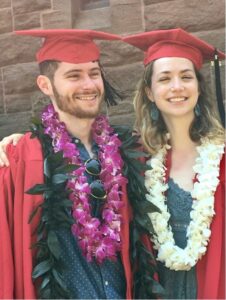
States over the course of the late 19th and into the 20th century. It then uses the insights gained from this analysis to compare and explain the variation in German and American responses to the coronavirus, focusing in particular on how each country provided care to those who fell ill. For her excellent work in German Studies, she received the Scott Prize. Eva is also the recipient of a German Academic Exchange Service Fellowship (DAAD), which will enable her to attend the Health Economics Master’s program at the University of Cologne or a similar program at the Technical University in Munich starting this fall.
Patrick Wolff ’21 GRST and ECON double major received the Congress-Bundestag Youth Exchange Fellowship (CBYX). He will embark for Germany in the late summer to attend classes at a German university followed by a six-month internship of his choice.
Jenna Lacey ’21 GRST minor and GOVT major received the John C. Blankenagel Prize for her dedication to studying German language and culture. She has been studying hard to prepare for the C1-German exam that she will have to pass in order to do graduate studies in Germany this or possibly next year.
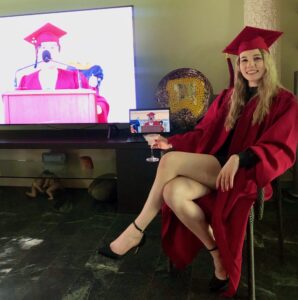
Alla Kiperman ’21 GRST minor and DANC major took online classes from her home in Vienna, Austria, last semester. She worked along three students from Munich University as Professor Bork-Goldfield’s Teaching Assistant. She met with beginning German students once a week practicing German. As the culmination of her Dance major and German Studies minor at Wesleyan University she has developed a dance theatre piece titled “A Portrait of Jenny.” This is a character exploration based on “Pirate Jenny” from Bertolt Brecht’s Die Dreigroschenoper or The Threepenny Opera. Alla’s interest in this particular character and play was sparked during her German Studies tutorial with Prof. Bäumel in Spring 2020, which was focused on Brecht and other prominent German playwrights of the 19th and 20th centuries. Challenging Brecht’s alienation effect through the lens of theatre and dance, she was aiming to give Jenny’s character a voice and make her story heard. It is a story of love, lust, pain, abuse, gender violence, betrayal, and overcoming: a story for all the “Jenny’s” among us and within us. Here is a YouTube link to a short teaser trailer of “A Portrait of Jenny“.
Over the summer Alla is planning to continue teaching dance at a local dance studio in Vienna, Austria, participate in various acting and dance workshops, take deep breaths, and enjoy some well-deserved time off with her family and friends.
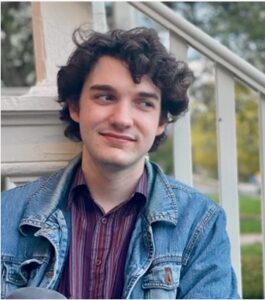
Julian White ’22 GRST minor and ENGL major was brave enough to become the producer of our WesGerman podcast. He received the Blankenagel Prize for his dedication to German. This summer he will be applying for a Fulbright Teaching Fellowship to teach English in Germany.
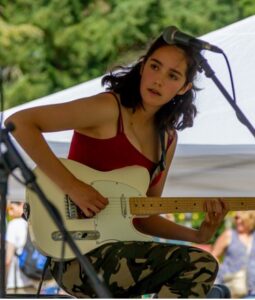
Iris Sackman ’22 GRST minor and FILM major was interviewed by Anna last month (see below) for the WesGerman podcast. Iris shared her thoughts on writing music and sharing her German song, “…ist es so weit?” (… is it time?)
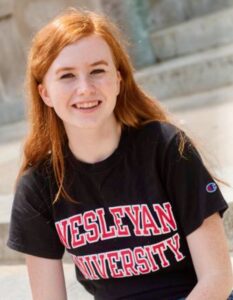
Anna Tjeltveit ’23 GRST and ENGL double major submitted outstanding and really fun music segments for our WesGerman podcast. She received the Prentice Price for her excellent work in German and her many fabulous contributions to the podcast. This summer she will be working as a camp counselor at Waldsee German Language Village, where she will teach German to campers between ages 6-17 using Immersion and Total Physical Response techniques to improve their listening and speaking abilities.
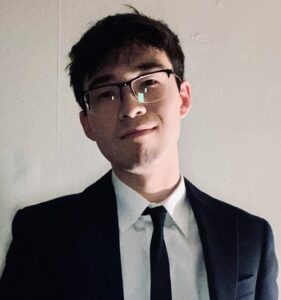
Jake Neuffer ’23 GRST and CSS double major will be working in Bozeman, Montana, where his family is from. While there, he plans on catching up on some reading, going hiking, and doing some writing on politics and fiction. On August 12th he will embark for Berlin, where he will spend a semester at the Duke in Berlin program, improving his German and observing Germany’s election first hand. Lucky him!
Sofia Khu ’22 GRST and COL double major will be taking a virtual class at Humboldt University with a DAAD scholarship this summer. Afterwards, she will be working on her COL thesis, a short novel which
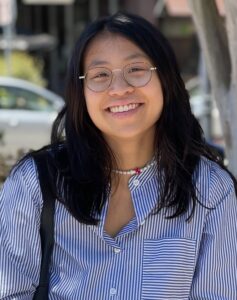
she started writing in Charlie Barber’s Longform Narrative class this past semester. It’s a Filipino-American immigration story centered around the relationship between a father and son.
Linus Mao ’23 GRST and COL double major plans to improve their German at the online summer program at the Freie Universität Berlin. Currently they are reading Roland Barthes, whose mourning diary after the death of his mother intrigues them very much.
Tohma Mitsuya ’23 GRST minor, ANTH and COL major will be working construction and landscaping in Big Sky, Montana, with three of his friends. Aside from that, he will also be playing lots of soccer, and basketball. He will go camping and on long hikes while brushing up on his photography. And of course, he will be reading lots of books delving into the classics of postmodern literature.
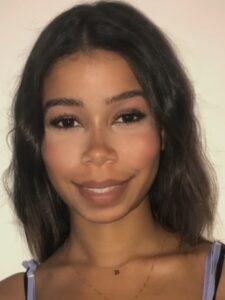
Bianca Ettinger ’23 GRST minor and double major in Molecular Biology and Chemistry will be traveling this summer to a small town outside Salzburg, Austria, to stay with her Oma and hopes to visit and explore Vienna and Berlin before studying abroad next Spring.
The sixth episode of the WesGerman podcast now online!

Check out the latest episode of the WesGerman podcast
The song Iris performs is called “Ist es soweit?” and you can find it also on Youtube here:
https://open.spotify.com/artist/5KiA8RaprArBMHARoJbWT6
WesGerman Podcast — Neue Episode
The fifth episode of the WesGerman podcast. Click here!
Segments:
1:12 – Musik mit Anna Tjeltveit: “Es kamen Menschen an” by Cem Karaca.
9:00 – Gespräch mit Jenna Lacey (Dept. Chair Frau Bork-Goldfield, student Julian White)
Frau Bork and Julian White’s favorite German words:
das Denkmal – monument
die Glockenblumen – bellflowers
die Schokoladenmousse – chocolate mousse
die Nachträglichkeit – afterwardness (I misspoke – Freudian slip!)
It’s a good time to get involved in German Studies at Wesleyan! For more info: https://www.wesleyan.edu/german/
Miranda Haymon ’16 talks about her career and what it meant to study abroad in Berlin

Miranda Haymon ’16, GRST and THEA double major discussed her career after graduation and her artistic process with Sam Morreale ’19 on March 17th. Her study abroad semester in Berlin during her sophomore played an important role in her life. She emphasized how important and helpful it was for her theatre career to be a GRST major and getting a liberal arts education. You can watch their conversation on YouTube.
Haymon’s upcoming radio play version of Pedro Pietri’s “The Masses Are Asses” (1974) will be aired on WESU Middletown 88.1FM this spring.

This picture was taken from Miranda’s bb_Brecht performance. Here is a video clip from it–> https://www.instagram.com/tv/CKMIonfjoq_/
You can follow Miranda on Instagram.
Miranda Haymon (she/they) is a Princess Grace Award/Honoraria-winning director, writer and curator. Recent projects include A Cakewalk (Garage Magazine & Gucci), Really, Really Gorgeous (The Tank), Everybody (Sarah Lawrence College), In the Penal Colony (Next Door @ New York Theatre Workshop, The Tank) and Mondo Tragic (National Black Theater). Haymon is a Resident Director at Roundabout Theatre Company and The Tank, a New Georges Affiliate Artist, a Usual Suspect at New York Theatre Workshop, a Space on Ryder Farm Creative Resident, member of the Lincoln Center Theater Directors Lab, and the Wingspace Mentorship Program. Haymon has held directing fellowships at WP Theater, New York Theatre Workshop, Manhattan Theatre Club, Roundabout Theatre Company, and Arena Stage. Haymon graduated from Wesleyan in 2016. For more information, please visit www.mirandahaymon.com.
Sam Morreale (they/them) is an advocate and facilitator for QTBIPOC+ storytellers and makers. Most of their work takes form through producing, directing, and consulting, particularly with a practice rooted in anti-racism and anti-oppression, transformative justice, healing and harm reduction. They have a unique view of the theatrical landscape, having worked in various capacities throughout the American Theater Industry quite early in their career. Recent Work: Facilitator/Curator for Rattlestick Playwright’s Theater, Community Conversations. Consultant: ART/NY, Center Theatre Group, Boston Court Pasadena.







